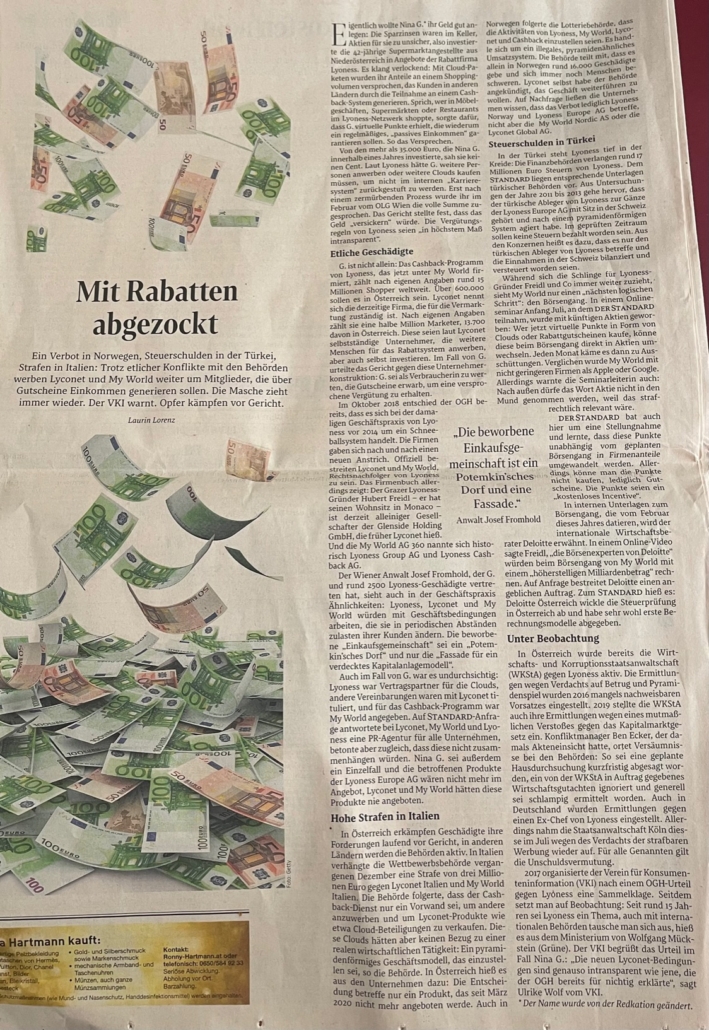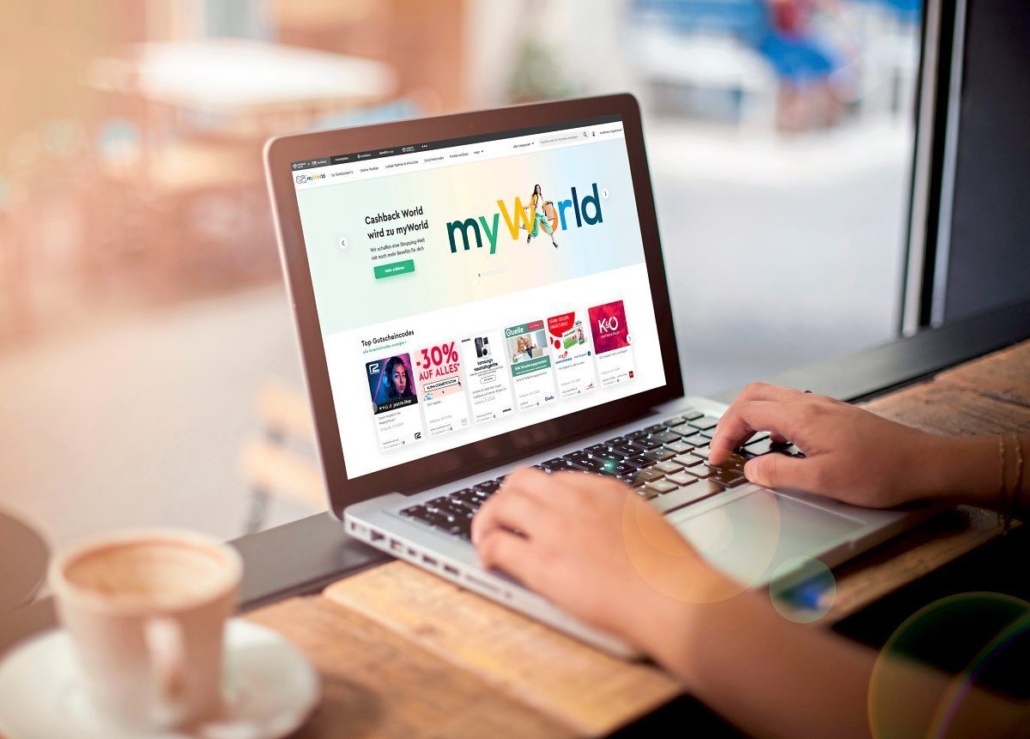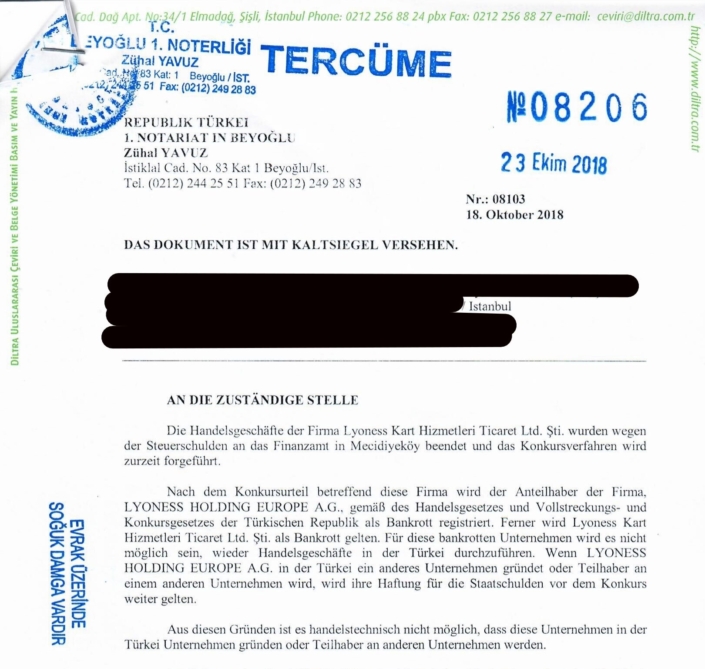Interesting article in major daily newspaper! “How Lyconet rip off their customers with discounts!”
Ban in Norway, tax debt in Turkey, penalties in Italy: despite many conflicts with the authorities, Lyconet and My World continue to solicit members to generate income via vouchers!
On July 23, 2021, this article appeared in one of the largest daily newspapers in Austria!
Here is the link to the original and below the translation: Wie Lyconet und Co ihre Kunden mit Rabatten abzocken – Geld – derStandard.at › Wirtschaft
Money back when others shop? What sounds too good to be true, usually is. Lyoness, Lyconet or MyWorld still attract customers with this scam to earn money on “clouds” and points. What remains are mostly lawsuits for damages.
Nina G.* wanted to actually invest her money well: The savings interest rates were in the cellar, shares were too unsafe for her, so the 42-year-old supermarket employee from Lower Austria invested in offers from the discount company Lyoness. It sounded tempting: With cloud packages, she was promised shares in a shopping volume that customers in other countries generate by participating in a cashback system. In other words, anyone who shopped at furniture stores, supermarkets or restaurants in the Lyoness network would ensure that G. received virtual points, which in turn would guarantee a regular, “passive income.” This was the promise.
Of the more than 35,000 euros that Nina G. invested within a year, she did not see a cent. According to Lyoness, G. would have had to recruit more people or buy more clouds to avoid being demoted in the internal “career system.” Only after a grueling trial was she awarded the full amount by the Vienna Higher Regional Court in February. The court found that the money was “trickling away.” Lyoness’ compensation rules were “highly non-transparent.”
Several aggrieved parties
G. is not alone: Lyoness’ cashback program, which now operates under the name My World, claims to have around 15 million shoppers worldwide. More than 600,000 are said to be in Austria. Lyconet is the name of the current company responsible for marketing. According to its own information, it counts half a million marketers, 13,700 of them in Austria. According to Lyconet, these are independent entrepreneurs who recruit other people for the discount system, but also invest themselves. In the case of G., the court ruled against this entrepreneurial construction: G. was to be considered a consumer who purchased vouchers in order to receive promised compensation.
In October 2018, the OGH already ruled that Lyoness’ business practice at the time before 2014 was a pyramid scheme. The companies gradually gave themselves a new coat of paint. Officially, Lyconet and My World deny being legal successors of Lyoness. However, the company register shows: Lyoness founder Hubert Freidl of Graz – who resides in Monaco – is currently the sole shareholder of Glenside Holding GmbH, which used to be called Lyconet. And My World AG 360 historically called itself Lyoness Group AG and Lyoness Cashback AG.
Viennese lawyer Josef Fromhold, who represented G. and around 2500 Lyoness victims, also sees similarities in business practices: Lyoness, Lyconet and My World would work with terms and conditions that they change at periodic intervals to the detriment of their customers. The advertised “shopping community” was a “Potemkin village” and only the “façade for a concealed capital investment model”.
In the case of G. it was also opaque: Lyoness was the contractual partner for the clouds, other agreements were titled Lyconet, and My World was stated for the cashback program. In response to a STANDARD inquiry, a PR agency at Lyconet, My World and Lyoness answered for all companies, but at the same time emphasized that they were not related. Moreover, Nina G. was an isolated case and the affected products of Lyoness Europe AG were no longer on offer, Lyconet and My World had never offered these products.
High penalties in Italy
In Austria, aggrieved parties are constantly fighting their claims in court, while in other countries the authorities are taking action. In Italy, the competition authority imposed a fine of three million euros on Lyconet Italy and My World Italy last December. The authority concluded that the cashback service was just a pretext to recruit others and to sell Lyconet products such as cloud investments. However, these clouds had no relation to any real economic activity: a pyramid business model that should be discontinued, the authority said. In Austria, the companies commented: The decision concerns only one product, which is no longer offered since March 2020. In Norway, the lottery authority also concluded that the activities of Lyoness, My World, Lyconet and Cashback should be discontinued. It was an illegal pyramid-like revenue system. The authority says that there are around 16,000 aggrieved parties in Norway alone and that people are still complaining. Lyconet itself had announced to the authority that it wanted to continue the business. When asked, the companies let it be known that the ban only affected Lyoness Norway and Lyoness Europe AG, but not My World Nordic AS or Lyconet Global AG.
Tax debts in Turkey
In Turkey Lyoness is deeply in the chalk: The tax authorities demand about 17 million euros of taxes from Lyoness. The STANDARD has received corresponding documents from Turkish authorities. Investigations from 2011 to 2013 show that the Turkish branch of Lyoness is wholly owned by Lyoness Europe AG, based in Switzerland, and that it operated as a pyramid scheme. No taxes are said to have been paid in the period under review. From the groups it is said in addition that it concerned only the Turkish branch of Lyoness and the incomes in Switzerland were balanced and taxed.
While the noose for Lyoness founders Freidl and Co tightens ever further, My World sees only one “next logical step”: the IPO. In an online seminar at the beginning of July, in which DER STANDARD participated, future shares were advertised: Those who buy virtual points in the form of clouds or discount vouchers now could exchange them directly for shares at the IPO. Every month there would then be distributions. My World was compared with no lesser companies than Apple or Google. However, the seminar leader also warned that the word “share” should not be used externally, as this would be liable to prosecution.
DER STANDARD also asked for a statement here and learned that these points are converted into company shares regardless of the planned IPO. However, the points could not be bought, only vouchers. The points are a “free incentive,” he said.
Internal IPO documents, dated February of this year, mention international business consultant Deloitte. In an online video, Freidl said “Deloitte’s stock market experts” expect My World’s IPO to be worth “tens of billions.” When asked, Deloitte denied an alleged assignment. MyWorld’s response to the STANDARD inquiry: Deloitte Austria handles the tax audit in Austria and has very well delivered first calculation models.
Under observation
In Austria, the Economic and Corruption Prosecutor’s Office (WKStA) has already become active against Lyoness. Investigations on suspicion of fraud and pyramid schemes were discontinued in 2016 for lack of provable intent. In 2019, the WKStA also discontinued its investigations into an alleged violation of the Capital Markets Act. Conflict manager Ben Ecker, who had access to the files at the time, locates failures on the part of the authorities: For example, a planned house search was canceled on short notice, an expert economic opinion commissioned by the WKStA was ignored, and investigations in general were sloppy. In Germany, too, investigations against an ex-head of Lyoness were discontinued. However, the public prosecutor’s office in Cologne resumed this in July on suspicion of criminal advertising. All those named are presumed innocent.
In 2017, the Association for Consumer Information (VKI) organized a class action lawsuit against Lyoness following an OGH ruling. Since then, the focus has been on monitoring: Lyoness has been an issue for around 15 years, and there have also been exchanges with international authorities, according to the ministry of Wolfgang Mückstein (Greens). The VKI welcomes the ruling in the case of Nina G.: “The new Lyconet conditions are just as non-transparent as those that the OGH already declared null and void,” says Ulrike Wolf from the VKI (Association for Consumer Information)
- The name has been changed by the editors.
Many thanks to the editor Mr. Laurin Lorenz for his accurate research!





Leave a Reply
Want to join the discussion?Feel free to contribute!